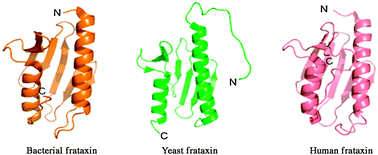The kinetics of folding of frataxin
Abstract
The role of the denatured state in protein folding represents a key issue for the proper evaluation of folding kinetics and mechanisms. The yeast ortholog of the human frataxin, a mitochondrial protein essential for iron homeostasis and responsible for Friedreich's ataxia, has been shown to undergo cold denaturation above 0 °C, in the absence of chemical denaturants. This interesting property provides the unique opportunity to explore experimentally the molecular mechanism of both the hot and cold denaturation. In this work, we present the characterization of the temperature and urea dependence of the folding kinetics of yeast frataxin, and show that while at neutral pH and in the absence of a denaturant a simple two-state model may satisfactorily describe the temperature dependence of the folding and unfolding rate constants, the results obtained in urea over a wide range of pH reveal an intriguing complexity, suggesting that folding of frataxin involves a broad smooth free energy barrier.

- This article is part of the themed collection: The free energy landscape: from folding to cellular function

 Please wait while we load your content...
Please wait while we load your content...